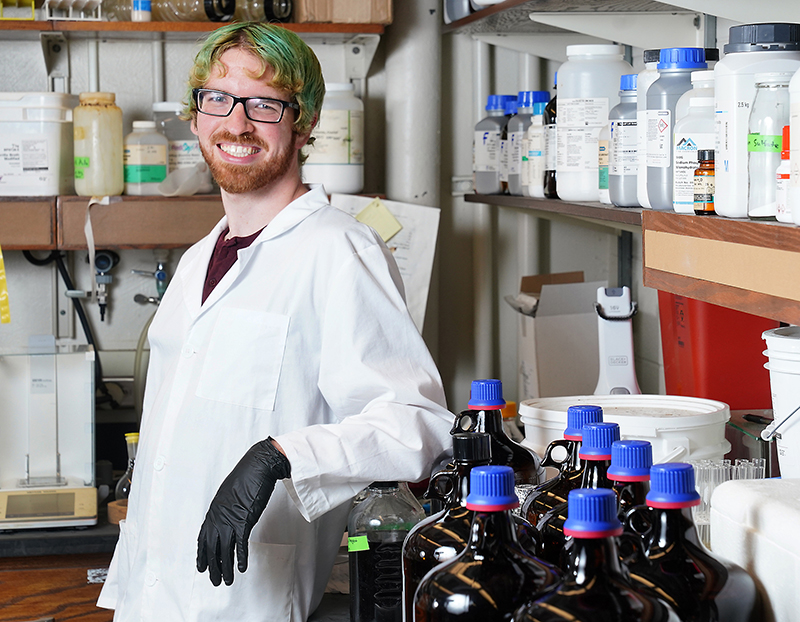The student
In Trevor Boram’s hometown of Greenville, Ohio, where he grew up on a farm and raised goats as a 10-year 4-H member, a high school chemistry teacher recognized and channeled his curiosity “about how scientists go about figuring things out.” While studying mathematics and biochemistry at Indiana University East, a faculty mentor guided Boram in his lab for three years. “I had good role models in science that really made me believe I could be a researcher,” he says. The IU East faculty member had completed a postdoc at Purdue and encouraged Boram to include it among the graduate programs he applied to. “My visit to Purdue was an amazing experience,” Boram recalls. “I felt like everybody here really wanted me in their department.” During the short talks that faculty presented to incoming graduate students, the work of Jeremy Lohman, assistant professor of biochemistry, caught Boram’s attention. “This guy’s doing some pretty cool stuff,” Boram recalls thinking. “The work was incredibly important, with medical applications of biochemistry to solve modern-day health crises.” Boram’s rotation in Lohman’s lab confirmed his interest, and since fall 2017, Boram has worked in the same research space as his IU-East mentor did previously.
The research
Boram studies how the human body makes fatty acids and their secondary metabolites, called polyketides. These specialized molecules are used to make pharmaceuticals. “We understand the general path of proteins in our body that perform chemistry that make fats essential for our survival,” he explains. “What we don’t get is how these proteins are doing the chemistry to actually make fats.” Boram’s molecular-level focus is on ketosynthase’s section of this assembly line. “Our lab has taken a new approach to studying this super-specific phenomenon,” he says. “I use synthetic organic chemistry to make novel compounds, which I then use to get pictures of these ketosynthases using X-ray crystollography.” Understanding how the ketosynthase section of making fats works might lead to new antibiotics that could overcome antibiotic resistance and extend the human lifespan. Boram’s interest is personal: he feels invested in doing research that could also lead to more treatment options to end the history of heart disease in his family.
Opportunities
His advisor encourages him to try new ideas he gleans from scientific literature, Boram says. He also has mentored 16 undergraduate students, which has both created friendships and honed his communication skills. He served on the organizing committee for the 2019 Hitchhiker’s Guide to the Biomolecular Galaxy symposium, and chaired the 2020 event.
Future plans
The intense focus Boram has learned in the lab has made its way into his personal life in the form of working out technically challenging guitar pieces in metal and classical music. He also enjoys video games and reading. After completing his PhD next spring, Boram hopes to work as a chemist in industry and conduct research in drug discovery that “could improve the life of the average person.”
